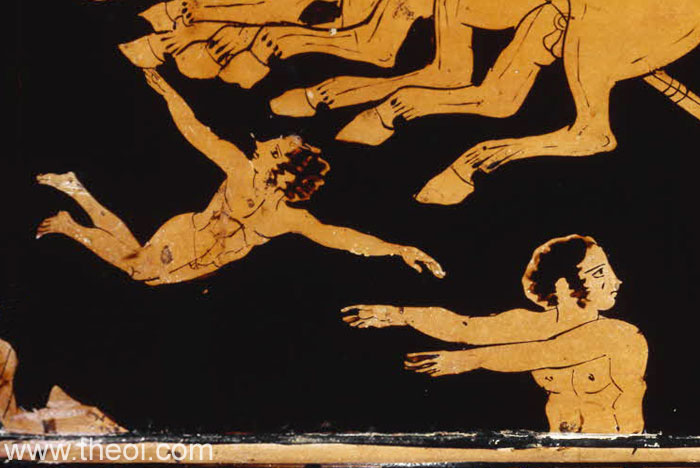PHAINON
Greek Name
Φαινων
Transliteration
Phainôn
Latin Spelling
Phaenon
Translation
Shining (phainô)

PHAINON (Phaenon) was the god of wandering star (aster planetos) Kronion (Cronion), the planet Saturn, or else Dios, the planet Jupiter.
He was either a son of the heavenly gods Astraios (Starry) and Eos (Dawn), or a handsome youth crafted by the Titan Prometheus and placed amongst the stars by Zeus.
The planet Saturn was dedicated to the Greek god Kronos (Cronus).
FAMILY OF PHAENON
PARENTS
[1] ASTRAIOS & EOS (parents of the Astra, presumably Phainon) (Hesiod Theogony 378, Apollodorus 1.8)
[2] Created by PROMETHEUS out of clay (Hyginus Astronomica 2.42)
ALTERNATE NAMES
Greek Name
Αστηρ Κρονιων
Transliteration
Astêr Kroniôn
Latin Spelling
Aster Cronion
Translation
Star of Kronos (Saturn)
CLASSICAL LITERATURE QUOTES
Hesiod, Theogony 378 ff (trans. Evelyn-White) (Greek epic C8th or C7th B.C.) :
"And Eos (Dawn) bare to Astraios (Astraeus, the Starry) the strong-hearted Anemoi (Winds) . . . a goddess mating in love with a god. And after these Erigenia [Eos] bare the star Eosphorus (Dawn-bringer), and the gleaming Astra (Stars) with which heaven is crowned."
Pseudo-Apollodorus, Bibliotheca 1. 8 - 9 (trans. Aldrich) (Greek mythographer C2nd A.D.) :
"The Titanes (Titans) had children . . . Eos and Astraios (Astraeus) were parents of Anemoi (Winds) and Astra (Stars)."
Pseudo-Hyginus, Astronomica 2. 42 (trans. Grant) (Roman mythographer C2nd A.D.) :
"Planets. It remains for us to speak of the five stars which many have called wandering, and which the Greeks call Planeta (Planets).
One of them is the star of Jove [Zeus], Phaenon by name, a youth whom Prometheus made excelling all others in beauty, when he was making men, as Heraclides Ponticus [Greek academician C4th B.C.] says. When he intended to keep him back, without presenting him to Jove as he did the others, Cupid [Eros] reported this to Jove [Zeus], whereupon Mercurius [Hermes] was sent to Phaenon and persuaded him to come to Jove [Zeus] and become immortal. Therefore he is placed among the stars."
Cicero, De Natura Deorum 2. 20 (trans. Rackham) (Roman rhetorician C1st B.C.) :
"Most marvellous [of all the stars of heaven] are the motions of the five Stars (Stellae), falsely called planets or Wandering Stars (Stellae Errantes) . . .
For the Star (Stella) that is called Saturnus (Saturn) [Kronos], the Greek name for which is Phaenon (the shiner), which is the farthest away from the earth, completes its orbit in about thirty years, in the course of which is passes through a number of remarkable phases, at one time accelerating and at another time retarding its velocity, now disappearing in the evening, then reappearing in the morning, yet without varying in the least degree throughout all the ages of eternity, but always doing the same things at the same times . . .
This regularity therefore in the Stars (Stellae), this exact punctuality throughout all eternity notwithstanding the great variety of their courses, is to me incomprehensible without rational intelligence and purpose. And if we observe these attributes in the Stars (Stellae), we cannot fail to enrol even them among the number of the gods."
Nonnus, Dionysiaca 5. 67 ff (trans. Rouse) (Greek epic C5th A.D.) :
"He [Kadmos (Cadmus) founder of Thebes] dedicated the seven gates [of the new-founded city] to the seven planets . . . The last [seventh gate] fell to the lot of Kronos (Cronus) [i.e. the planet Saturn] the seventh planet."
[N.B. The seven "planets" were the five visible planets, the sun and the moon.]
SOURCES
GREEK
- Hesiod, Theogony - Greek Epic C8th - 7th B.C.
- Apollodorus, The Library - Greek Mythography C2nd A.D.
- Nonnus, Dionysiaca - Greek Epic C5th A.D.
ROMAN
- Hyginus, Astronomica - Latin Mythography C2nd A.D.
- Cicero, De Natura Deorum - Latin Rhetoric C1st B.C.
BIBLIOGRAPHY
A complete bibliography of the translations quoted on this page.